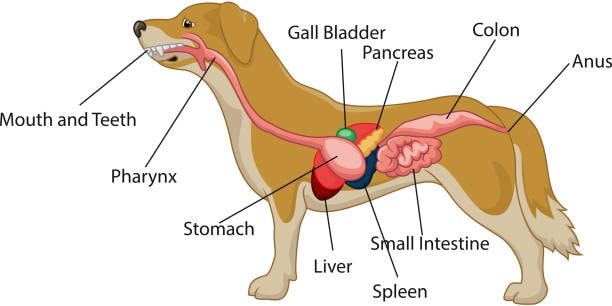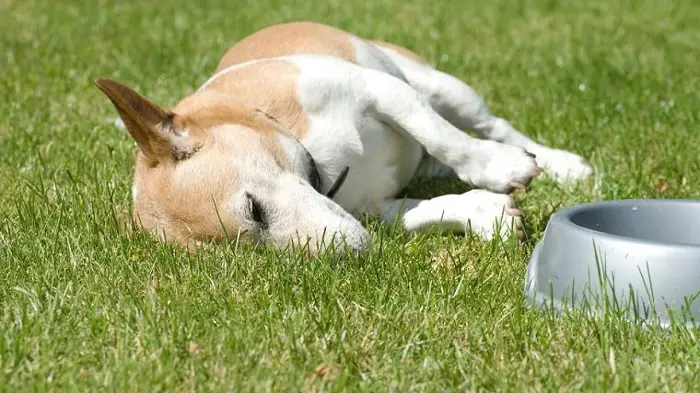The dog is an omnivorous animal which means it eats vegetables and meats. The food behavior of dogs varies from region to region. Colitis in dogs causes large intestine (colon) inflammation and manifests as diarrhea, abdominal pain, and weakness. The condition cures very fast with appropriate treatment and management.
What is colitis in Dogs?
Colitis is the inflammation of the large bowel or intestine, that is, the colon. The condition is manifested mainly by diarrhea or lose feces associated with a dog’s large intestine. Colitis is also called large bowel diarrhea. The feces may contain blood or mucous, which may be difficult to pass.
Causes of Large Bowel Colitis in Dogs
The causes of canine colitis may be infectious or non-infectious. The infectious causes of colitis are:
- Bacteria like Salmonella, E Coli, Campylobacter, and Clostridium.
- Fungal Infection like Histoplasmosis.
- Parasites like whipworms.
- Protozoa like Giardia, Cryptosporidium spp.
- Pancreatitis.
The non-infectious causes of dog colitis are:
- Trauma or injury to the colon.
- Allergies.
- Primary inflammatory disease of the bowel (lymphoplasmacytic, eosinophilic, histiocytic, and granulomatous).
- Stress.
- Food allergies.
- Contaminated Food.
- Irritate Bowel Syndrome (IBS).
- Immune diseases.
Risk Factors of the Disease
The risk factors of the disease are:
- Stress due to transportation, environmental change, or moving.
- Contaminated food and water.
- Overcrowding.
- Sudden change in the diet.
- Food hypersensitivity.
- Few dog breeds like French Bulldog and Boxers.
Clinical Signs of Canine Colitis
The clinical signs and symptoms and geographical location may vary from dog to dog. The usual clinical signs are as follows:
- Frequent loose feces.
- Straining during and after defecation.
- A small amount of red-colored blood may be present in the feces.
- Mucous may be present in the feces.
- The affected dog wants to defecate frequently.
- Weight loss is rare.
- Vomiting may be present.
- Constipation.
- Reluctance to eat or drink.
- Pain during defecation.
Diagnosis of Colitis in Dogs
The diagnosis of colitis can be made by the following means:
- Clinical history.
- Specific clinical signs.
- Microscopic examination of feces.
- Rectal examination.
- Complete blood test.
- Radiographic examination (X-ray), Barium contrast X-ray.
- Colonoscopy.
- Fecal culture to identify causal bacteria or fungus.
- Colon biopsy.
- Abdominal Ultrasonography.
Treatment for Canine Colitis
The treatment depends on the causes of colitis. The line of treatment includes:
- Antimicrobials (Broad spectrum antibiotics).
- NSAIDs can be given for inflammatory colitis.
- Feed a hypoallergenic or low-residue diet to your dog.
- Increase fiber in dog diet like Psysillium, fructooligosaccharide (FOS), or beet pulp.
- You can give anti-spasmodic drugs that reduce the colon spasm.
- If the cause of colitis is parasitic, use broad-spectrum anthelmintics.
- You can use a probiotic capsule to improve the gut environment after treatment for colitis.
Prevention of Colitis in Dogs
Colitis is mainly caused by feeding and managing dogs. You can easily prevent the disease in your lovely dog by following measures:
- Maintain a healthy dog diet.
- Never change dog food suddenly.
- Regularly use anthelmintics for all animals in your house.
- Reduce stress in your dogs.
Final Advice on Colitis in Dogs
Most dogs diagnosed with colitis has a good prognosis. Most dogs get cured if the disease is detected early and given appropriate treatment. If you follow the preventive measures and minimize the risk factors, the disease may never happen to your dog.
I think this write-up will help you a lot. If you want to know more about specific questions, please inbox us through Facebook or the comment box.

